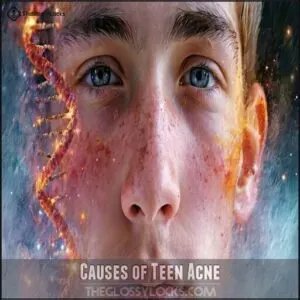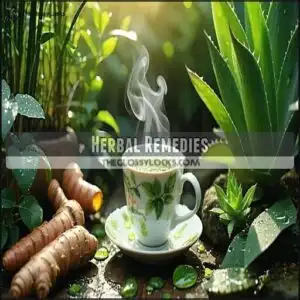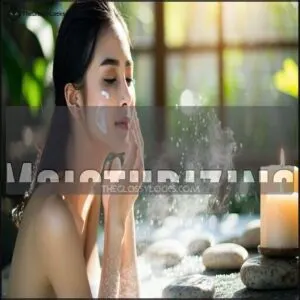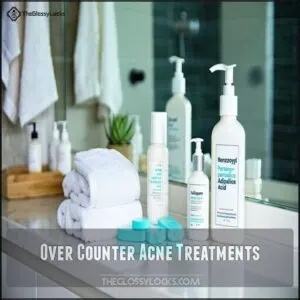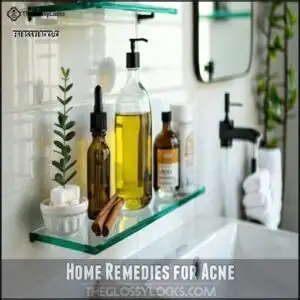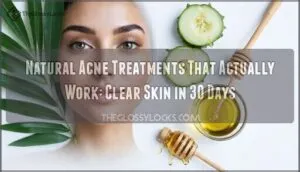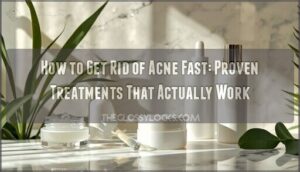This site is supported by our readers. We may earn a commission, at no cost to you, if you purchase through links.
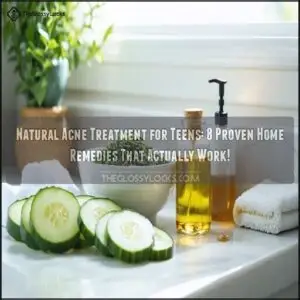
Try tea tree oil, which reduces inflammation, or honey masks that fight bacteria while moisturizing.
Washing with gentle cleansers twice daily keeps pores clear—remember, scrubbing harder won’t clear acne faster!
Green tea compresses reduce redness, while proper hydration and a diet low in dairy and sugar address acne from within.
Stress management matters too; those pre-exam breakouts aren’t coincidental.
Most natural acne treatments for teens require consistency rather than overnight miracles.
The right combination might just be your skin’s best friend.
Table Of Contents
- Key Takeaways
- Causes of Teen Acne
- Natural Acne Treatments
- Skincare Practices
- Over Counter Acne Treatments
- Home Remedies for Acne
- Frequently Asked Questions (FAQs)
- How can you manage acne in a teenager?
- What can teens eat to potentially reduce acne?
- How to get rid of acne naturally?
- What are teenage acne and pimples?
- How to get rid of pimples in a teen?
- Can green tea treat teenage acne?
- How long do natural treatments take?
- Can supplements interact with medications?
- When should teens see a dermatologist?
- Are essential oils safe for teen skin?
- Conclusion
Key Takeaways
- You’ll see better results from consistent, gentle cleansing rather than harsh scrubbing – wash twice daily with mild cleansers and remember that even oily skin needs moisturizing with non-comedogenic products.
- Your diet directly impacts your skin – reduce dairy and sugar intake while increasing foods rich in omega-3 fatty acids, vitamin A, and zinc to fight inflammation and support skin healing.
- You can effectively treat acne with natural remedies like tea tree oil (for spot treatment), honey masks (for antibacterial benefits), and green tea compresses (to reduce redness) before turning to stronger over-the-counter options.
- You’ll need to manage stress through adequate sleep, exercise, and relaxation techniques as hormonal fluctuations triggered by stress can worsen breakouts – your emotional wellbeing and skin health are connected.
Causes of Teen Acne
Your teen’s face isn’t staging a rebellion just for fun – those breakouts are primarily driven by hormonal changes that trigger your oil glands to work overtime, creating the perfect environment for acne-causing bacteria.
You’re also fighting a combination of genetics, diet, stress, and skincare habits that can either help calm the storm or accidentally fan the flames.
Hormonal Changes
Nearly every teen experiences hormonal changes that trigger acne during puberty.
Your body’s sudden surge in androgens increases sebum production, turning your once-clear skin into a battlefield.
Lifestyle factors can also substantially contribute to these breakouts.
- Tiny oil glands suddenly working overtime, flooding pores with excess sebum
- White blood cells rushing to inflamed areas like firefighters to a blaze
- Bacteria multiplying in clogged pores like unwelcome houseguests
- Cortisol levels spiking during stress, causing emergency breakouts
- Hormonal imbalances creating a perfect storm at the most socially awkward times
Genetic Predisposition
Your genes play a significant role in determining your acne severity. If your parents struggled with teen acne, you’re more likely to face similar challenges due to inherited genetic markers.
| Genetic Factor | Impact on Acne | Treatment Approach |
|---|---|---|
| Family History | High correlation | Personalized treatment plans |
| Inheritance Patterns | Determines oil production | Early intervention |
| Genetic Markers | Influences inflammation | Consistent skincare |
| Hormonal Sensitivity | Affects acne triggers | Targeted natural remedies |
Don’t worry—understanding your genetic predisposition helps create more effective natural acne treatments! This knowledge is key to addressing your specific acne triggers and finding the right treatment approach.
Poor Skincare Routines
While genetics influence your skin’s natural oil production, how you treat your skin daily matters even more.
Your teen skincare routine could actually be making acne worse, as over-washing strips natural oils, causing your skin to produce more sebum in response.
Harsh scrubbing damages your skin barrier, while sleeping in makeup clogs pores overnight, and even your face mask hygiene plays a role in breakouts.
Choosing the right products for teen acne treatment starts with understanding what not to do.
Dietary Factors
Surprisingly often, what you eat directly impacts your skin.
Here’s a short, engaging blockquote in the same tone as the passage:
Your dinner plate today secretly becomes your complexion tomorrow. Choose wisely!
High sugar intake spikes insulin, triggering oil production and inflammation that leads to breakouts.
Food sensitivities, particularly to dairy, can worsen acne, and poor gut health disrupts your skin’s balance, while dehydration concentrates toxins.
Swap processed foods for anti-inflammatory whole foods rich in fiber and vitamins. Remember: your plate today becomes your face tomorrow!
Natural Acne Treatments
You can combat teen acne effectively without harsh chemicals by using natural treatments that work with your body’s healing processes.
These gentle yet powerful remedies target the root causes of breakouts while supporting your skin’s natural balance, often with ingredients you’ll find right in your kitchen.
Dietary Approaches
While it’s clear that hormones play a huge role in teen acne, what your teen eats matters just as much.
Tweaking their diet can often clear skin without harsh chemicals.
Here are 5 dietary approaches that work wonders for acne-prone skin:
- Choose low-glycemic foods like oatmeal and whole grains to reduce inflammation
- Boost protein with lean meats and seafood
- Add vitamin A and zinc-rich foods like carrots and pumpkin seeds
- Incorporate omega-3 fatty acids from ground flaxseeds
- Stay hydrated with water instead of sugary drinks
To further support skin health, consider how probiotic supplements benefit the gut microbiome.
Lifestyle Changes
Beyond food choices, daily habits can dramatically impact your skin’s health.
Regular exercise increases blood circulation, helping to clear toxins while reducing stress hormones that trigger breakouts.
Aim for 7-9 hours of quality sleep (yes, that means putting your phone down!), and drink at least eight glasses of water daily.
Avoid touching your face with unwashed hands—your smartphone screen probably has more bacteria than a toilet seat, which can lead to breakouts due to the presence of unwanted bacteria and can be exacerbated by poor hygiene.
Stress Management
During stressful times, your skin might rebel with breakouts as cortisol levels spike.
Stress management is your secret weapon against acne! Daily meditation or yoga can substantially reduce inflammation that triggers pimples.
Prioritize sleep—it’s when your skin repairs itself. Even simple breathing exercises can lower cortisol levels.
Remember, your emotional wellbeing and skin health are connected, so taking time to unwind isn’t just nice—it’s necessary!
Herbal Remedies
Through centuries of traditional medicine, herbal remedies have proven effective for teen acne.
Tea tree oil’s antimicrobial properties reduce inflammation and redness—just apply the purest form available to trouble spots. Aloe vera gel soothes irritated skin, while turmeric benefits include fighting bacteria.
Green tea (mixed with honey) makes an excellent mask due to its antioxidant properties. You can even find tea tree oil products for various applications.
For hormone balance, herbs like saw palmetto and vitex can help when taken consistently.
Skincare Practices
You’ll need a consistent skincare routine that works with your body’s natural processes instead of against them.
A gentle approach that balances cleansing, moisturizing, and protection gives your skin the tools it needs to heal itself, much like giving a plant the right soil and water instead of drowning it, which is a gentle approach.
Gentle Cleansing
In the context of teen acne treatment, gentle cleansing forms the foundation of effective skincare.
Wash your face twice daily with a mild soap and lukewarm water—hot water strips natural oils while cold water doesn’t remove enough dirt.
Soft cloths are your skin’s best friend; harsh scrubbing only irritates.
Remember, frequency matters: morning and night is ideal.
After washing, pat dry instead of rubbing for a natural skincare approach that respects your skin’s balance.
Many teens find relief using a mild cleanser option for a mild and effective treatment.
Moisturizing
Contrary to popular belief, moisturizing is essential for teen acne treatment, even with oily skin.
The right product helps maintain your skin’s natural balance. You can find the right teen acne moisturizer online.
Here are five non-comedogenic moisturizers perfect for acne-prone skin:
- Aloe vera gel for sensitive skin
- Jojoba oil (mimics natural sebum)
- Hyaluronic acid serums for hydration without greasiness
- Glycerin-based lotions for dry skin areas
- Tea tree infused moisturizers for their antibacterial properties
Sun Protection
Your acne treatment isn’t complete without sun protection. While you might think sunshine helps dry out pimples, UV exposure can actually worsen acne and increase skin cancer risk.
Apply zinc-based, non-comedogenic sunscreen (SPF 30+) daily as part of your morning routine. Many people find that UPF-rated clothing offers enhanced sun protection.
Most acne medications increase sun sensitivity, making protection essential. Wear hats during peak hours and remember—proper sun protection is one of the most effective natural acne remedies for teens.
Over Counter Acne Treatments
You’ll find effective relief from pesky pimples with readily available over-the-counter treatments like benzoyl peroxide, salicylic acid, and adapalene.
These science-backed options work by killing bacteria, removing excess oil, and unclogging pores—think of them as your skin’s personal cleanup crew without the hefty dermatologist bill, providing a personal cleanup solution.
Benzoyl Peroxide
Beyond good skincare habits, benzoyl peroxide stands as a powerhouse in teen acne treatment options.
This over-the-counter product works by killing acne-causing bacteria and reducing inflammation.
When using benzoyl peroxide:
- Start with lower strengths (2.5%) to minimize dryness and irritation
- Apply a thin layer to clean, dry skin once daily
- Give it 4-6 weeks to see maximum results
Remember, it can bleach fabrics, so apply at night and use white pillowcases!
Salicylic Acid
Inside the realm of teen acne treatments, salicylic acid stands as a gentle yet effective warrior against stubborn breakouts.
It works by exfoliating blocked pores and reducing inflammation, making it perfect for sensitive skin.
You’ll find this acne treatment natural in various product types—cleansers, spot treatments, and pads.
For best results, use products with 0.5-2% concentration, starting with lower strengths to avoid potential side effects like dryness.
To ensure the best outcome, it is crucial to follow the instructions carefully and be aware of the potential side effects.
Retinoids
While salicylic acid tackles surface issues, retinoids work deeper by speeding up your skin’s natural turnover.
These vitamin A derivatives come in several forms, from over-the-counter retinol to prescription-strength tretinoin.
Retinoids help unclog pores, reduce inflammation, and even improve skin tone leftover from healed pimples.
They’re like tiny drill sergeants, ordering your skin cells to behave properly, which can lead to improve skin tone and other benefits.
Just remember—they can cause dryness initially, so start slow and be aware of the potential for dryness!
Adapalene
Freedom from clogged pores awaits with adapalene, the only prescription-strength retinoid available over-the-counter for teens 12 and older.
You’ll apply a pea-sized amount nightly after gentle cleansing. Adapalene benefits include preventing pimples before they form and reducing inflammation.
Expect temporary side-effects like dryness and redness during the first few weeks—it’s just your skin adjusting. Don’t give up if acne initially worsens; your clearer complexion needs 8-12 weeks to shine through, with adapalene being the key to this transformation, offering freedom from acne concerns.
Home Remedies for Acne
Many teens find relief from acne with simple ingredients already in their pantry.
Tea tree oil, a powerful natural remedy, effectively tackles those stubborn blemishes when properly diluted with a carrier oil.
Here are five effective home remedies for teen acne:
- Apply diluted tea tree oil (100% pure, USDA Certified Organic) as a spot treatment to soothe irritation and reduce redness
- Create DIY masks using honey and cinnamon for their antibacterial properties
- Make herbal toners with witch hazel or green tea to balance skin’s pH
- Try apple cider vinegar (ACV) diluted with water as an astringent
- Use aloe vera gel to calm inflammation and speed healing
Remember, consistency is key with natural skincare acne solutions.
While these natural remedies won’t work overnight, many teens report clearer skin within weeks when combined with proper diet and gentle cleansing routines.
Frequently Asked Questions (FAQs)
How can you manage acne in a teenager?
Help teens manage acne by establishing a gentle twice-daily cleansing routine.
Using over-the-counter treatments with benzoyl peroxide or salicylic acid is also beneficial.
Maintaining a balanced diet and avoiding picking at blemishes to prevent scarring are crucial steps in managing acne.
What can teens eat to potentially reduce acne?
You’ll want to eat fruits, veggies, whole grains, and omega-3 rich foods like salmon.
Skip dairy, sugary treats, and processed snacks that can trigger breakouts.
Drinking plenty of water helps too!
How to get rid of acne naturally?
Like a garden needs natural care, your skin craves gentle attention.
Cleanse with tea tree oil, apply diluted apple cider vinegar, use raw honey masks, and maintain a diet rich in fruits and vegetables.
What are teenage acne and pimples?
Teenage acne develops when your hormones surge during puberty, causing oil glands to overproduce sebum that clogs pores.
These blockages form pimples – red, inflamed bumps that can appear on your face, chest, and back.
How to get rid of pimples in a teen?
Persistent prevention pays off!
Wash your face twice daily with gentle cleansers containing salicylic acid.
Don’t pop pimples—apply tea tree oil or honey as spot treatments instead.
Cut back on sugar and dairy while drinking plenty of water.
Can green tea treat teenage acne?
Green tea’s EGCG compounds can help clear your acne by reducing oil production and fighting inflammation.
You’ll benefit from its antioxidant properties whether you drink it or apply it topically—nature’s little skin-clearing superhero.
How long do natural treatments take?
Natural treatments can take anywhere from a few weeks to a few months to show results.
It depends on your consistency and skin type, but patience pays off.
Think of it as a skin marathon, not a sprint!
Can supplements interact with medications?
Yes, supplements can interact with medications, affecting their effectiveness or causing side effects.
Always consult your doctor before starting any supplements, especially if you’re taking prescription acne medications like antibiotics or retinoids.
When should teens see a dermatologist?
You’ll need to see a dermatologist if OTC treatments aren’t working after 6-8 weeks.
Your acne is severe or painful, leaves scars, spreads beyond your face, or affects your self-esteem and social life.
Are essential oils safe for teen skin?
Some essential oils can benefit teen skin when properly diluted, but they aren’t all created equal.
You’ll need to patch test first and avoid applying tea tree or lavender oils directly to your face.
Conclusion
Battling teen acne doesn’t require an arsenal of chemicals! Your journey to clearer skin can be as natural as a garden after rain.
By consistently applying these natural acne treatments for teens—from tea tree oil to stress management—you’ll give your skin the gentle care it craves.
Remember, patience is your ally; natural remedies work with your body, not against it. You’ve got this!
With these eight proven remedies in your corner, you’re well on your way to healthier, happier skin.

